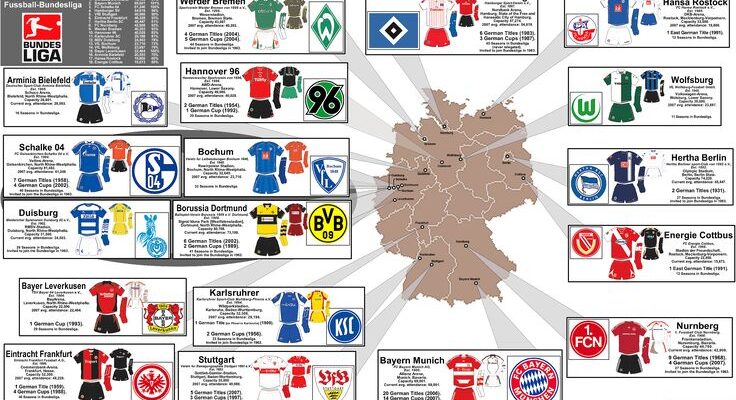On August 24, 1963, a new chapter in German football began. The Bundesliga, envisioned as a unified professional league, kicked off, forever transforming the landscape of the sport in the nation. From its nascent beginnings to its current status as a global footballing powerhouse, the Bundesliga has been a crucible for talent, a stage for legendary moments, and a testament to the unwavering passion of its fans.
The Genesis: A League Forged from Necessity
Before the Bundesliga, German football operated under a fragmented system of regional championships. While successful in producing talent and generating local rivalries, this structure often saw Germany`s best teams missing out on consistent, high-level competition. The advent of the Bundesliga was a pragmatic, albeit initially controversial, step towards professionalization and national unity in football. It promised a higher standard of play, better financial stability for clubs, and a more structured path for national team development.
The inaugural season saw 16 teams vying for the title. While the first champions, 1. FC Köln, etched their name into history, it was the subsequent decades that truly solidified the league`s identity. This period introduced the world to footballing titans who would redefine the sport.
The Golden Era: Emperors, Bombers, and Goalkeeping Giants
The late 1960s and 1970s marked the emergence of players who would become synonymous with German football`s golden age. Franz Beckenbauer, `Der Kaiser,` elegant and revolutionary as a sweeper, led Bayern Munich to unparalleled success, including three consecutive European Cups. Alongside him was Gerd Müller, `Der Bomber,` an unassuming yet prolific striker whose goal-scoring records seemed almost mythical. One might even argue that his knack for finding the net, often from seemingly impossible angles, occasionally blurred the lines between skillful opportunism and sheer witchcraft.
Goalkeepers like Sepp Maier, known for his acrobatic saves and eccentric personality, further cemented the league`s reputation for producing world-class talent. These individuals, and many others like Uwe Seeler, weren`t just exceptional players; they were pioneers who elevated the Bundesliga onto the international stage, paving the way for future generations.
Evolution and Expansion: Navigating Modern Football
As the decades progressed, the Bundesliga adapted to the evolving global football landscape. The 1980s and 90s saw continued competition, with new teams challenging Bayern Munich`s occasional dominance. The turn of the millennium brought further professionalization, modern stadium construction, and a renewed focus on youth development, often spurred by the disappointing performance of the German national team in the early 2000s.
This commitment to nurturing homegrown talent became a hallmark of the league. Clubs invested heavily in academies, producing a steady stream of world-class players. This approach, arguably a direct contrast to some leagues` reliance on massive transfer spending, has ensured a vibrant domestic talent pool.
The Modern Bundesliga: Speed, Tactics, and Global Appeal
Today, the Bundesliga is renowned for its high-octane, attacking football. The tactical sophistication has grown immensely, yet the fundamental German ethos of directness and intensity remains. Modern legends like Thomas Müller, a Raumdeuter whose unique interpretation of space defies traditional categorization; Toni Kroos, the midfield maestro; Robert Lewandowski, a goal-scoring machine whose consistency is almost robotic; and Manuel Neuer, the revolutionary “sweeper-keeper,” continue to captivate audiences worldwide.
Beyond the pitch, the Bundesliga boasts a unique selling proposition: its unparalleled fan culture. The “50+1 rule,” which ensures that club members retain majority voting rights, acts as a bulwark against pure commercialism, fostering deep connections between clubs and their communities. This results in packed stadiums, vibrant choreographies, and an atmosphere that many consider the best in Europe. While some might lament the occasional lack of a truly competitive title race (a polite nod to Bayern`s formidable run), the drama and excitement from second place downwards, coupled with European qualification battles and relegation dogfights, rarely disappoint.
A Legacy Continues
From its debut over six decades ago, the Bundesliga has not merely survived; it has thrived. It represents more than just a football league; it embodies a commitment to community, development, and an unwavering passion for the beautiful game. Its history is not just a collection of statistics and match reports but a tapestry woven with incredible moments, iconic figures, and the collective heartbeat of millions of fans. As the league continues to evolve, one thing remains constant: the Bundesliga will always be a place where football history is not just made, but vividly lived.
The story of the Bundesliga is far from over. Each matchday adds a new chapter to this compelling narrative of German football excellence.









